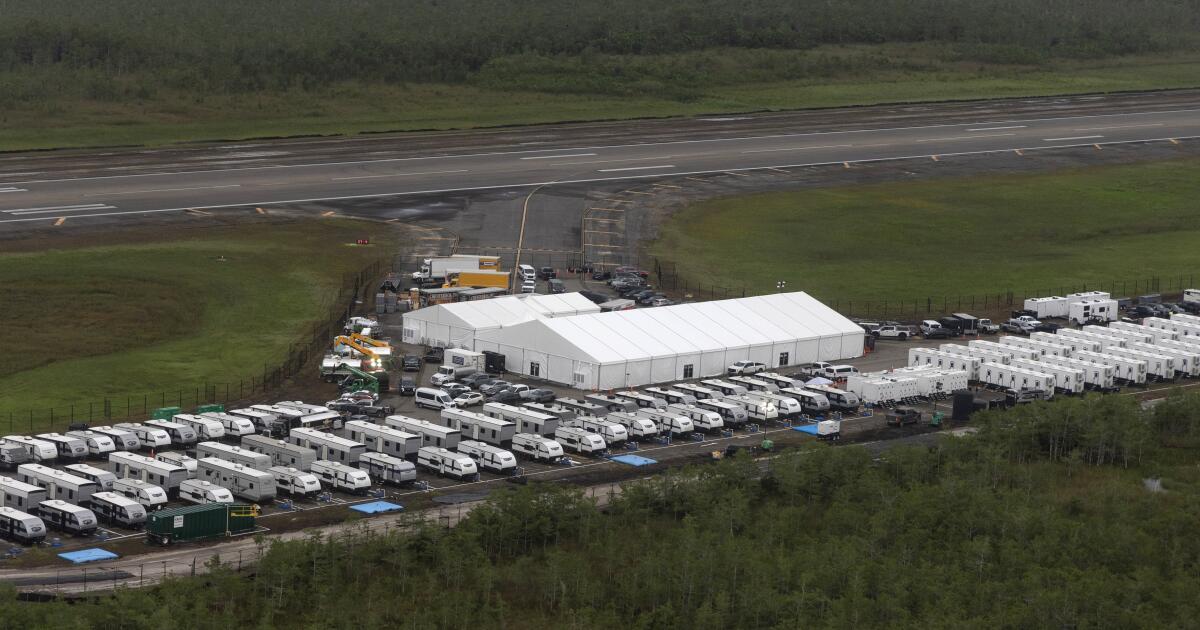D.C. Mayor Bowser walks delicate line with Trump, reflecting the city’s precarious position
NEW YORK — As National Guard troops deploy across her city as part of President Trump’s efforts to clamp down on crime, D.C. Mayor Muriel Bowser is responding with relative restraint.
She’s called Trump’s takeover of the city’s police department and his decision to activate 800 members of the guard “unsettling and unprecedented” and gone as far as to cast his efforts as part of an “authoritarian push.”
But Bowser has so far avoided the kind of biting rhetoric and personal attacks typical of other high-profile Democratic leaders, despite the unprecedented incursion into her city.
“While this action today is unsettling and unprecedented, I can’t say that, given some of the rhetoric of the past, that we’re totally surprised,” Bowser told reporters at a news conference responding to the efforts. She even suggested the surge in resources might benefit the city and noted that limited home rule allows the federal government “to intrude on our autonomy in many ways.”
“My tenor will be appropriate for what I think is important for the District,” said Bowser, who is in her third term as mayor. “And what’s important for the District is that we can take care of our citizens.”
The approach underscores the reality of Washington’s precarious position under the thumb of the federal government. Trump has repeatedly threatened an outright takeover of the overwhelmingly Democratic city, which is granted autonomy through a limited home rule agreement passed in 1973 that could be repealed by Congress. Republicans, who control both chambers, have already frozen more than $1 billion in local spending, slashing the city’s budget.
That puts her in a very different position from figures such as California Gov. Gavin Newsom or Illinois Gov. JB Pritzker, Democrats whose states depend on the federal government for disaster relief and other funding, but who have nonetheless relentlessly attacked the current administration as they lay the groundwork for potential 2028 presidential runs. Those efforts come amid deep frustrations from Democratic voters that their party has not been nearly aggressive enough in its efforts to counter Trump’s actions.
“Unfortunately she is in a very vulnerable position,” said Democratic strategist Nina Smith. “This is the sort of thing that can happen when you don’t have the powers that come with being a state. So that’s what we’re seeing right now, the mayor trying to navigate a very tough administration. Because this administration has shown no restraint when it comes to any kind of constitutional barriers or norms.”
A change from Trump’s first term
Bowser’s approach marks a departure from Trump’s first term, when she was far more antagonistic toward the president.
Then she routinely clashed with the administration, including having city workers paint giant yellow letters spelling out “Black Lives Matter” on a street near the White House during the George Floyd protests in 2020.
This time around, Bowser took a different tact from the start. She flew to Florida to meet with Trump at Mar-a-Lago after he won the election and has worked to avoid conflict and downplay points of contention, including tearing up the “Black Lives Matter” letters after he returned to Washington in response to pressure from Republicans in Congress.
The change reflects the new political dynamics at play, with Republicans in control of Congress and an emboldened Trump who has made clear he is willing to exert maximum power and push boundaries in unprecedented ways.
D.C. Councilmember Christina Henderson said she understands Bowser’s position, and largely agrees with her conclusion that a legal challenge to Trump’s moves would be a long shot. Trump invoked Section 740 of the District of Columbia Home Rule Act in his executive order, declaring a “crime emergency” so his administration could take over the city’s police force. The statute limits that control to 30 days unless he gets approval from Congress.
“The challenge would be on the question of ‘Is this actually an emergency?’” said Henderson, a former congressional staffer. “That’s really the only part you could challenge.”
Henderson believes the city would face dim prospects in a court fight, but thinks the D.C. government should challenge anyway, “just on the basis of precedent.”
Trump told reporters Wednesday that he believes he can extend the 30-day deadline by declaring a national emergency, but said “we expect to be before Congress very quickly.”
“We’re gonna be asking for extensions on that, long-term extensions, because you can’t have 30 days,” he said. “We’re gonna do this very quickly. But we’re gonna want extensions. I don’t want to call a national emergency. If I have to, I will.”
Limited legal options
Bowser’s response is a reflection of the reality of the situation, according to a person familiar with her thinking. As mayor of the District of Columbia, Bowser has a very different relationship with the president and federal government than other mayors or governors. The city is home to thousands of federal workers, and the mass layoffs under Elon Musk’s Department of Government Efficiency have already had a major impact on the city’s economy.
Her strategy has been to focus on finding areas where she and the new administration can work together on shared priorities.
For now, Bowser appears set to stick with her approach, saying Wednesday that she is focused on “making sure the federal surge is useful to us.”
During a morning interview with Fox 5, she and the city’s police chief argued an influx of federal agents linked to Trump’s takeover would improve public safety, with more officers on patrol.
Police Chief Pamela Smith said the city’s police department is short almost 800 officers, so the extra police presence “is clearly going to impact us in a positive way.”
But Nina Smith, the Democratic strategist, said she believes Bowser needs a course correction.
“How many times is it going to take before she realizes this is not someone who has got the best interests of the city at heart?” she asked. “I think there may need to be time for her to get tough and push back.”
Despite Trump’s rhetoric, statistics published by Washington’s Metropolitan Police show violent crime has dropped in Washington since a post-pandemic peak in 2023. A recent Department of Justice report shows that violent crime is down 35% since 2023, reaching its lowest rate in 30 years.
Colvin writes for the Associated Press. AP writers Ashraf Khalil and Will Weissert in Washington contributed to this report.

